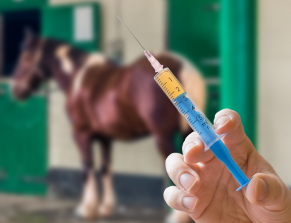Discuss Influenza Vaccinations With Your Vet

The personalized questions in EquineGuelph.ca/vaccinationtool helps horse owners start conversations with their vet for an annual plan.
by: Equine Guelph/Jackie Bellamy-Zions
A real and present threat to your horse’s health
More than 100 racing yards were on lockdown this past Thursday Feb. 7 as horse races were called off due to a flu outbreak in Britain. All horse owners need to guard against the very real and present threat of equine influenza. According to a recent FEI health update in response to equine flu outbreaks, the virus can be easily transmitted between horses that are in close contact, such as attending events, group training and hunting, or between vaccinated and unvaccinated horses in the home yard.
“Vaccinating horses against equine influenza is key to combating the spread of equine influenza,” FEI Veterinary Director Göran Åkerström said. “It is important that all horses are vaccinated, regardless of whether or not they compete or come into contact with other horses, but there are also biosecurity measures that should be put in place, including best hygiene practices.”
Plan Ahead
The approach of spring and the anticipation of outings and increased exposure to pathogens means it is time to book the vet for shots. How well do you understand the vaccines currently available and the discussions you should have with your vet?
Six questions are asked in Equine Guelph’s healthcare tool – the Vaccination Equi-Planner, kindly sponsored by Merck Animal Health, to help horse owners start those conversations. Every farm has different risk factors including: age, use, sex, exposure to outside horses and geography.
Whether you are the proud owner of a young foal, competition horse, hobbyhorse or broodmare, the Vaccination Equi-Planner (EquineGuelph.ca/vaccinationtool) points out considerations for each and discusses different core and optional vaccines your vet may recommend.
Your veterinarian will be up to date on what diseases are endemic in your location. Did you know horses aged 1 – 5 tend to be more susceptible to influenza? Horses that travel or are exposed to traveling horses or new arrivals are also at increased risk.
‘’Equine influenza is one of the most frequent respiratory tract disease in horses. As such, it has a significant impact on equine populations worldwide. Vaccination along with appropriate biosecurity measures remains one of the most effective ways to prevent this highly contagious disease. However, immunity against influenza is rather short-lived, so horses that are at higher risk of getting infected can benefit from a semi-annual booster. Horse owners should discuss with their veterinarian the most appropriate vaccination schedule based on their horses’ specific circumstances. Also, as the influenza virus constantly changes through antigenic drift, best practice calls for using a vaccine that includes recent strains of influenza as recommended by the World Organization for Animal Health (OIE). An influenza modified live virus vaccine can also provide coverage against current strains through broad cross-protection,’’ says Dr. Serge Denis, Equine Consultant with Merck Animal Health.’’
What is a Modified Live Vaccine?
A modified live equine A/Equine 2 influenza vaccine for intranasal administration is commercially available in Canada.
“I have had some interesting conversations with horse owners regarding vaccinations,” says Veterinarian and Ontario Association of Equine Practitioner President, Dr. Amy Bennet. “There does seem to be some misconceptions regarding specific vaccines, especially the modified live vaccines. By far, the biggest concern I hear from horse owners is that their horse could potentially become sick from the modified live vaccine and they are concerned that their horse could then pass this disease onto other horses. I also hear concerns of unvaccinated horses becoming inadvertently vaccinated from a recently vaccinated horse within the herd.”
Bennet explains that a modified live vaccine is derived from the naturally occurring pathogen, but is modified in a way that it doesn’t produce clinical disease, while still mounting a strong immune response. Modified live vaccines for influenza are given intra-nasally. When the vaccine replicates in the horse’s nasal mucosa, a rapid local immune response occurs. The horse develops an immune response that combats disease similar to when the horse is exposed to the wild strain equine influenza virus, making sure that the tissues that would be first exposed to the disease have the strongest immunity to it.
By giving a modified live vaccine, your veterinarian is administering a live pathogen that has been modified so it will not cause the clinical disease but will mount an immune response to help provide protection against the disease, should the animal ever be exposed.
More about the science behind modified live and inactivated vaccines can be found at EquineGuelph.ca/vaccinationtool under resources.
Know the Rules
Given the highly contagious nature of the disease and the impact on horse health and industry economics, some racing regulators, like British Horse Racing Authority, and racetracks, such as Woodbine, as well as organizations including the United States Equestrian Federation, Federation Equestre Internationale (FEI) and Equestrian Canada have rules requiring vaccination against equine influenza.
Check on the records required. For example, Equine Canada passports must be signed and stamped by your certified veterinarian and filled in with the date of administration, name and batch number of the vaccine, method of administration (Intra-muscular or Intra-nasal) among other specified details. There are also windows of time before competitions for the administrations of vaccines to be aware of.
Equine Guelph and Merck Animal Health are pleased to provide a comprehensive starting point for horse owners to begin drafting their annual personalized immunization plan with Vaccination Equi-Planner at EquineGuelph.ca/vaccinationtool. This information will help when discussing vaccinations with your vet.










